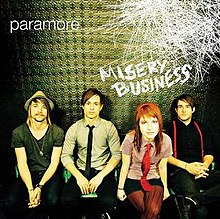Misery Business
| "Misery Business" | ||||||||
|---|---|---|---|---|---|---|---|---|

CD single cover art
|
||||||||
| Single by Paramore | ||||||||
| from the album Riot! | ||||||||
| B-side | "Stop This Song (Lovesick Melody)" "My Hero" "Sunday Bloody Sunday" |
|||||||
| Released | June 4, 2007 | |||||||
| Format | CD single, digital download, promo CD | |||||||
| Recorded | 2007; The House of Loud (New Jersey) |
|||||||
| Genre | Pop punk,emo | |||||||
| Length | 3:31 | |||||||
| Label | Fueled by Ramen | |||||||
| Writer(s) | Hayley Williams, Josh Farro | |||||||
| Producer(s) | David Bendeth | |||||||
| Paramore singles chronology | ||||||||
|
||||||||
|
||||||||
"Misery Business" is a song by American rock band Paramore and serves as the lead single from their second studio album, Riot! (2007). The song impacted radio on May 22, 2007. Meanwhile "CrushCrushCrush" moved up to No. 16, "Misery Business" peaked on the Billboard Hot 100 at No. 26 (for the week of 1/12/2008), making it the band's highest-charting single until "Ain't It Fun" reached No. 10 in 2014. It also peaked at No. 3 on the Hot Modern Rock Tracks chart. "Misery Business" was the group's first charting single in the UK with more than 20,000 copies created within less than a year of the song's debut. It also succeeded in many countries including Mexico, Argentina, Chile, and Brazil. The song is considered the band's "breakthrough" hit and is crediting with introducing the band to a mainstream audience. The video for "Misery Business" was the third to be directed by Shane Drake for the band, and Alternative Press named "Misery Business" the Video of the Year in 2007.
On July 25, 2015, the song was certified triple-platinum in the United States, the first of the band's songs to have sold three million units.
The phrase, "Misery Business", was first heard on a Stephen King adaptation psycho-thriller film, Misery (1990).
At first glance, the song comes off as a typical teenage girl singing about what she wants; but when actually focusing it can be seen that Williams is actually empowering the sadness in the situation instead of self-pitying. The origin of the song is ambiguous with Williams giving conflicting explanations. The Fueled by Ramen website reports that Williams wrote the song based on feedback the band received after a question she posted on the band's LiveJournal asking what people were ashamed of. However, on the band's blog, Williams claims the song was written about a past experience involving a male friend who she felt was being manipulated by a girl, and later on when Williams and her friend began to date, she penned the lyrics to "finally explain my side of the story and feel freed of it all". Later, Williams addressed the lyrics in the chorus:
...
Wikipedia

